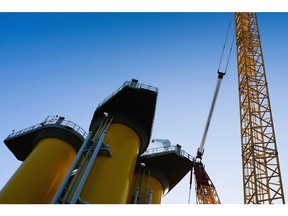
Article content
(Bloomberg) — Clean energy investments in the US are shrinking fast amid the rollback of tax incentives and policy uncertainties under President Donald Trump’s administration, with Republican districts hardest hit.
THIS CONTENT IS RESERVED FOR SUBSCRIBERS ONLY
Subscribe now to read the latest news in your city and across Canada.
- Exclusive articles from Barbara Shecter, Joe O'Connor, Gabriel Friedman, and others.
- Daily content from Financial Times, the world's leading global business publication.
- Unlimited online access to read articles from Financial Post, National Post and 15 news sites across Canada with one account.
- National Post ePaper, an electronic replica of the print edition to view on any device, share and comment on.
- Daily puzzles, including the New York Times Crossword.
SUBSCRIBE TO UNLOCK MORE ARTICLES
Subscribe now to read the latest news in your city and across Canada.
- Exclusive articles from Barbara Shecter, Joe O'Connor, Gabriel Friedman and others.
- Daily content from Financial Times, the world's leading global business publication.
- Unlimited online access to read articles from Financial Post, National Post and 15 news sites across Canada with one account.
- National Post ePaper, an electronic replica of the print edition to view on any device, share and comment on.
- Daily puzzles, including the New York Times Crossword.
REGISTER / SIGN IN TO UNLOCK MORE ARTICLES
Create an account or sign in to continue with your reading experience.
- Access articles from across Canada with one account.
- Share your thoughts and join the conversation in the comments.
- Enjoy additional articles per month.
- Get email updates from your favourite authors.
THIS ARTICLE IS FREE TO READ REGISTER TO UNLOCK.
Create an account or sign in to continue with your reading experience.
- Access articles from across Canada with one account
- Share your thoughts and join the conversation in the comments
- Enjoy additional articles per month
- Get email updates from your favourite authors
Sign In or Create an Account
or
Article content
Businesses canceled or delayed more than $1.4 billion in new factories and clean energy projects last month, bringing the total since January to $15.5 billion, according to an analysis by E2, a non-partisan group that advocates for renewables and policies to protect the environment. The canceled projects across battery, electric vehicles and solar, were expected to create nearly 12,000 new jobs.
Article content
Article content
Article content
Republican districts have seen the most contraction. More than half of the canceled, delayed or closed factories and electricity projects, or some $9 billion worth of investments, have been in GOP districts so far this year, the report said. So too were some 10,000 jobs that have disappeared.
Article content
By signing up you consent to receive the above newsletter from Postmedia Network Inc.
Article content
Also, the value of new investments seen in May is just about one third of shelved projects, E2 said.
Article content
The clean energy industry is rapidly losing investments at a time US utilities are rushing to meet the growing power demand from data centers expansion and new factories. More projects are poised for cancellations as Trump continues undermining renewable power sources.
Article content
The Republican-controlled Congress is currently working to push through a massive tax-and-spending bill, Trump’s top legislative priority, that would gut clean energy tax credits.
Article content
“If Congress moves forward with killing these tax policies, we’re going to see more cancellations, more job lost, and that’s just the start,” E2 Executive Director Bob Keefe said in an interview.
Article content
This will reduce electricity generated from solar, wind and batteries, which accounted for about 90% of all new energy added to the grid last year.
Article content
“That means we’re not going to be able to meet the soaring electricity demand we have for everything from AI to data centers, to all the things that you and I plug into a wall, and that means higher power bills,” Keefe added.
Article content

.jpg) 5 hours ago
1
5 hours ago
1
 English (US)
English (US)